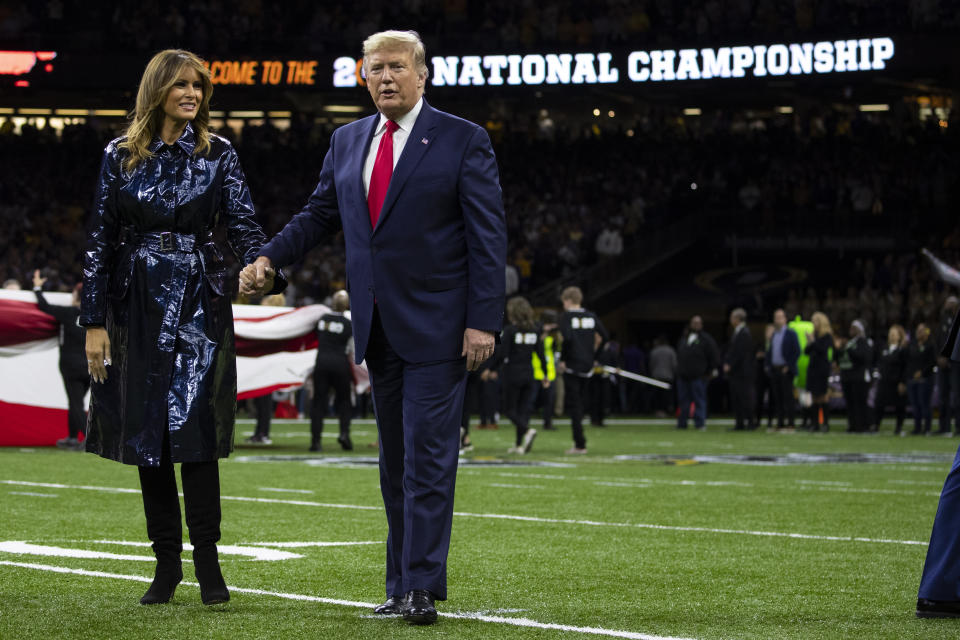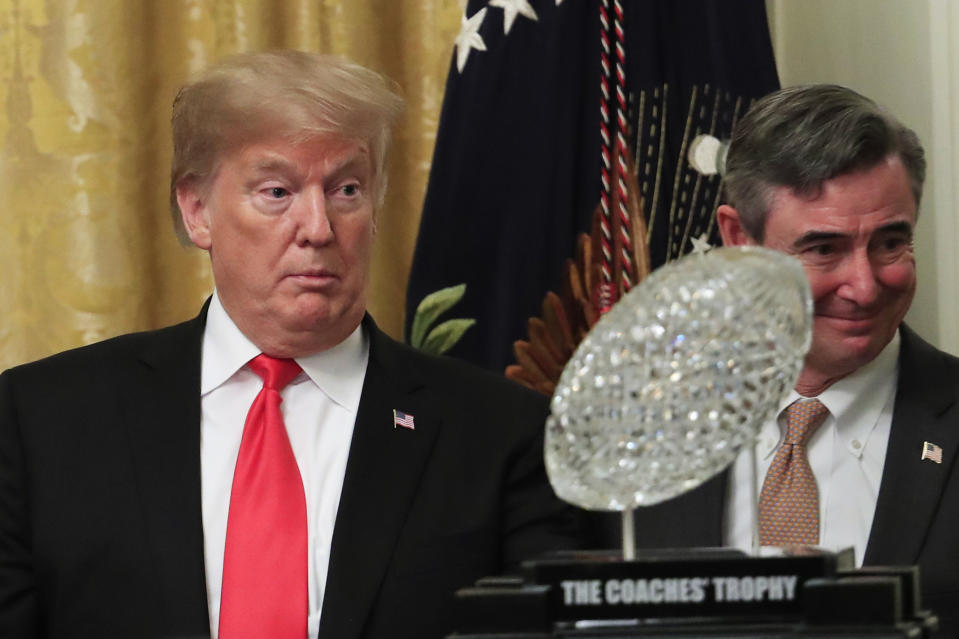President Trump's hope for NFL's return doesn't align with college football's reality
The drumbeat for football to return in the fall took on a political overtone the past few days.
The governors of both Alabama and Nebraska made pleas to the citizens of their states to practice social distancing to help college football come back.
Alabama Gov. Kay Ivey, according to Alabama Political Reporter, dangled football as a lure after issuing a stay-at-home order on Friday. “If you’re eager for a fall football season coming up, what we’re doing today gives us a better chance of being able to do that as well,” Ivey said.
Nebraska Gov. Pete Ricketts has resisted using a state-wide stay-at-home order, instead relying on a Directed Health Measure and encouraging people to stay home. “If you want to see football this fall, you better be staying home now,” said Ricketts, according to News Channel Nebraska.
It raised a fascinating question: Can the potential of college football being played become an incentive to quell the spread of the coronavirus and to help bring college football back this fall? The answer is complicated.
That question for college football comes on a day when President Donald Trump inserted himself into the national sporting conversation. President Trump held calls with the commissioners from a majority of the professional sports leagues in America. Those ranged from mainstream commissioners like Roger Goodell of the NFL and Adam Silver of the NBA to Dana White of the UFC and Vince McMahon of the WWE.

There were no concrete solutions, but rather hopes that didn’t appear to be grounded by any specific science. "They want to get back,” Trump said about the sports leagues. “They've got to get back. We want to get back soon. Very soon."
While Trump’s call initiated the collision between sports and politics, there was a curious omission. Of all the commissioners he spoke with, including the WNBA and PGA, there were no leaders from the collegiate sports landscape. (An NCAA spokesperson said they wouldn’t have any comment.)
While the NCAA still clings to its status as amateur sports, college football is one of the country’s most popular sports and college basketball annually captures the attention of the country for a month during March Madness. The Trump conference call came on the day when the Final Four was scheduled to own the sporting calendar with a semifinal double-header on Saturday evening.
The absence of college football from Trump’s purview was most curious because he’d staked clear territory in the sport recently. Three times in the season’s final months, Trump appeared at college football games and was greeted warmly by fans entrenched in his base. Those giddy receptions came at three of the season’s highest profile games – LSU at Alabama, Army vs. Navy and the College Football Playoff title game in New Orleans. (They also came in the wake of Trump being roundly booed at the World Series in Washington D.C.)
The governors’ pleas this week in Alabama and Nebraska and Trump’s call on Saturday hints that we could see sports politicized more as the pandemic goes on.
College football is one of the great unifiers in the country, as it weaves through major cities and cozy college towns, looms as hugely popular in both red and blue states, and along the way touches nearly every cross-section of American race, economic class and religion. But in terms of the coronavirus, college football is also the most complicated.
It’s becoming increasingly difficult to imagine 90,000 people at Memorial Stadium at the University of Nebraska and 101,000 people at Bryant-Denny Stadium for opening weekend. The rites of passages of college football all involve things that are antithetical to quelling the coronavirus – a contact sport, heavy travel for large swaths of people, fans in close quarters at tailgates and wedged into the stadium. It also will likely require schools to be in session on campus, which is looking foreboding as numerous campuses around the country are switching to online learning for their summer schools.

The hopes of governors in states crazy about college football are colliding with the reality that college football may be the most difficult sport to operate logistically. The academic presence and campus setting, combined with the regimented schedule that generally coincides with an academic calendar, make it a complicated lift.
In an article on NFL.com last week, NFL chief medical officer Allen Sills pointed out how more widespread testing would be needed around the country to allow NFL teams just to get back into their facilities.
"As long as we're still in a place where when a single individual tests positive for the virus that you have to quarantine every single person who was in contact with them in any shape, form or fashion, then I don't think you can begin to think about reopening a team sport," Sills told Judy Battista. "Because we're going to have positive cases for a very long time."
The messages of the governors to distance for the sake of football comes at a time when there’s a lot of conflicting information. Nearly a week before Ivey’s plea to the people of Alabama to stay home so there could be football in the fall, she defended the state not using a shelter-in-place order. “Y’all, we are not Louisiana, we are not New York State, we are not California,” she said. “Right now is not the time to order people to shelter in place.”
The contradictions continued today, as ESPN reported that Trump believes the NFL should start on time in September. A few hours later, California Gov. Gavin Newsom said he doesn’t anticipate stadiums open for football in California in August and September.
This much is clear with the college football season looming nearly five months away: Overcoming complications for the sport operating with full stadiums and amid traditional timelines is going to take more than politicians’ wishes.
More from Yahoo Sports:

 Yahoo News
Yahoo News 